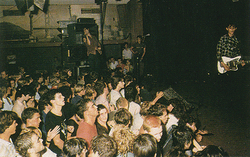Is Pop Undead?
Tue. January 31, 2006Categories: Abstract Dynamics
 |  |
If there is a current coalescence of fascination around hauntology, there is also a mounting anxiety about the death, dearth, end of Pop. A few examples: this atrocious piece on the ‘death of black music’ (significant only for the statistics it cites), Simon’s 05 round-up for Frieze, a number of recent threads on Dissensus, including this one and this one. The suspicion is inescapable: part of the reason why hauntology should appeal to us so much now is that, unconsciously, and increasingly consciously, we suspect that something has died.
Nothing lasts forever, of that I’m sure
Announcements of the demise of pop are nothing new of course. And there any number of reasons to be sceptical about the language of ‘death’ and morbidity (not least because it concedes too much to the vitalist valorizations of life). The fact is that nothing ever really dies, not in cultural terms. At a certain point – a point that is usually only discernible retrospectively – cultures shunt off into the sidings, cease to renew themselves, ossify into Trad. They don’t die, they become undead, surviving on old energy, kept moving, like Baudrillard’s deceased cyclist, only by the weight of inertia. Cultures have vibrancy, piquancy only for a while. Lyric poetry, the novel, opera, jazz had their Time; there is no question of these cultures dying, they survive, but with their will-to-power diminished, their capacity to define a Time lost. No longer historic or existential, they become historical and aesthetic – lifestyle options not ways of life.
We are lulled into the belief that Pop should be immune to this process by the illusion to which those within any culture, any civilization, fall prey (perhaps it is is a necessary illusion?): the belief that our own culture will continue forever. The question we need to ask, then, is not so much ‘will pop die?’ but has pop already reached the point of undeath? Has it seduced us into an entropy tango, clasping us with zombie fingers as it slowly winds down towards permanent irrelevance? Questions worth raising, if only because as soon as they are no longer raised we can be sure that Pop really has reached its terminal phase.
What alarms me is the lack of alarm about Pop’s current situation. Where is the chorus of disapproval and disquiet about a group like the Arctic Monkeys? Granted, it is not that the Arctic Monkeys are significantly worse than any of their retro forebears (although if anything ought to set alarm bells ringing, it is a situation where ‘not being worse’ than mediocre predecessors is thought of as worthy of comment, still less of muted celebration). What is novel is the discrepancy between the AMs’ modest ‘achievements’ and the scale of their success. Critical success is more easily bought than ever, of course, so we shouldn’t be surprised that the NME rates the Monkeys’ album as fifth best British album of all time (disgust would be more a appropriate response actually). But such subjective and professionally expedient over-valuations would be insignificant were it not for the quantitative scale of the Arctic Monkeys’ success – fastest selling UK debut album ever! What this implies is a libidinal deficit in Pop’s audience as well as in its Old Media commentariat – a much more worrying trend.
The Arctic Monkeys’ success is as glum news for Popists as it is for those of us who still pledge alliegance to Pop’s modernist tendencies. (It should be noted here that, with r and b and hip hop faltering and stuttering, Popist-approved Pop has been one of the last remaining places where modernism’s guttering flame persists.) As Marcello has suggested recently over at Church of Me, the new New Pop (Rachel Stevens, Girls Aloud) is barely secure, certainly not thriving, and its (relatively) disappointing sales compare ominously with the voracious triumph of Retro-Indie and the New Authenticity (Blunt! Jack Johnson!) There has been a kind of reversal, with new New Pop occupying the old pre-Indie independent position of the popular-experimental, and Indie dominating the mainstream. (Hence I would argue that, contra Simon in the Frieze article, it is new New Pop, not some putative, ghastly fusion ‘of Grime and Indie rock’, that is today’s closest equivalent to postpunk.) A little insight into the times can be gleaned from the fact that NME has been reduced to ostentatiously banning Blunt from its awards ceremony (because there are a MILLION miles between his maudlin mumbling and that of their darlings, naturally). James Blunt versus Coldplay: is this what Pop antagonism is reduced to? A pseudo-conflict that should excite only Swiftian ridicule.
Hate’s not your enemy, love’s your enemy
Such plastic antagonisms (and NME/ Corporate Indie can’t survive without convincing its consumers that they are an alternative to something, that there is some region of commonsense, complacent, middle of the road mediocrity that they don’t already occupy) substitute for the real antagonisms that once sustained Pop. Even the most ardent devotees must sense something is missing – there’s just a hint in Doherty’s puppy dog junky eyes that even he recognizes the sad fact that even if he dies, it won’t stop being Pantomime. (Although one suspects that the current malaise can in large part be accounted for by the fact that ‘what is missing’ is not even noticed, still less mourned or hankered for.)
Indie may have all but driven black musics out of the British charts, hybridity may be off the agenda, but you can bet your bottom dollar that all of those Indie bands just love hip hop and r and b. Pop at its most febrile was stoked by critical and negative energies that are now exhausted – or which have been exiled as far too impolite for today’s pot-pourri, pomo buffet in which you can have a bit of Indie here, a bit of r and b there, where contradictions and anomalies have been photoshopped out, where it all happily fits into one well-adjusted consumer basket. If the revolutionary tumult of the postpunk era was characterized by restless dissatisfaction, anxiety, uncertainty, rage, harshness, unfairness – that is, by an atmosphere of relentless criticism – today’s Pop scene is suffused with laxness, bland acceptance, quiescent hedonism, luxuriant self-satisfaction (ALL those awards shows!) – that is by, PR.
 |  |
What Pop lacks now is the capacity for nihilation, for producing new potentials through the negation of what already exists. One example, of many possible. Both the Birthday Party and New Pop nihilated one another: far from existing in a relation of mutual acceptance or of mutual ignorance each defined themselves in large part by not being the other. One shouldn’t rush to conceive of this in simple-minded dialectical terms as thesis-antithesis, since the relationships are not only oppositional – there is always more than one way to nihilate, and it is always possible for any individual thing to nihilate more than one Other. It seems at least plausible to suggest that the capacity for renewed nihilation is what has driven Pop. So let’s dare to conceive of Pop not as an archipelago of neighbouring but unconflicting options, not as a sequence of happy hybridities or pallid incommensurabilities, but as a spiral of nihilating vortices. Such a model of Pop is utterly foreign to postmodern orthodoxies. But Pop is either modernist or it is nothing at all.
Just because something is current doesn’t mean it is new. Saying that Pop was better twenty-five years ago is NOT to be nostalgic; on the contrary, it is to resist the ambient, airtight, total nostalgia that can not only tolerate but delight in the latest regurgitations on the Indie retreadmill.
Let’s dispense once and for all with Popist-Deleuzianism/Deleuzian Popism’s obligatory positivity. The fact we happen to be alive now doesn’t mean that we must be committed to the belief that this is the best time to live EVER. We have no duty to search out entertainment and spread a little excitement everywhere we go. (Think of how hard to please audiences were in the mid seventies, in the midst of a veritable cornucopia by comparison with today’s grim desert; and think of what that dissatisfaction produced.) So, please, no consumerist homilies about the fact that ‘it is always possible to find good records, no matter what the year.’ Yes, of course it is, but as soon as Pop is reduced to good records it really is all over. When Pop can no longer muster a nihilation of the World, a nihilation of the Possible, then it will only be the ghosts that are worthy of our time.